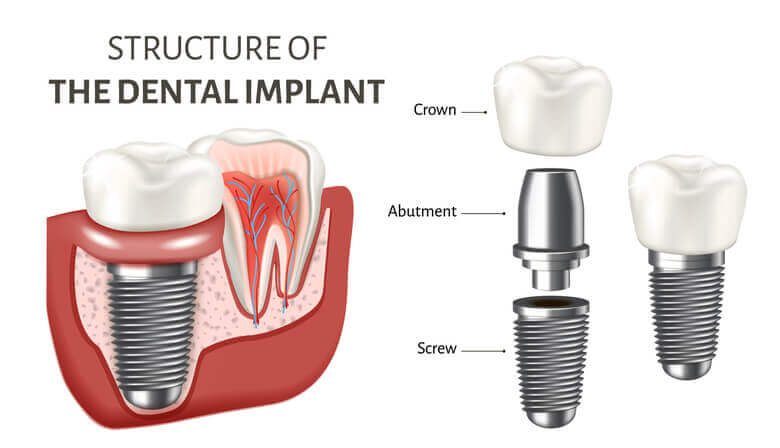Since the 1960s, dental implants have been fabricated from medical-grade (Grade 23) titanium but in 2005, a European company called CeraRoot introduced fully ceramic implants which were FDA approved in 2011. Today, the leader in dental implants, Nobel Biocare, has designed and produced some of the most advanced two-piece ceramic metal-free implants as an alternative to established titanium implants. Dr. Kissel has always believed in using the latest and most effective dental / periodontal technology for the benefit of his patients. Consequently, he offers his Manhattan, New York City, patients the option of choosing eithertitanium or ceramic two-piece dental implants for replacing their missing teeth. Moreover, both types of implants are placed using microsurgery for more precise results and a better surgical and healing process.
Ceramic Dental Implants
Ceramic or non-metal dental implants are made from zirconium. It’s not the same material as the crystal used to make jewelry but it is part of the same family. This material has gained popularity as a substitute for titanium implants because it is extremely durable and is metal-free. It can also help resolve some aesthetic issues and health concerns related to all-metal titanium implants. They are a great alternative for dental implant patients who choose to avoid having metals placed in their body, are allergic or sensitive to titanium, or have an autoimmune disease or galvanic reactions to metals.
Characteristics of Ceramic Implants
The basic characteristics of ceramic implants are very similar to titanium implants. Ceramic dental implants are biocompatible and fuse easily with the jawbone in a process of osseointegration. In addition, the types of ceramic implants used by Dr. Kissel are part of a two-piece and screw-retained implant design.

The Benefits of Ceramic Implants
One of the main benefits of ceramic dental implants is that ceramic implants are non-conductive so they do not release any ions. Additionally, ceramic implants have a low plaque affinity and bacterial adhesion. According to research, ceramic implants aid peri-implant health by reducing inflammation. It has been shown that ceramic abutments had good sealing properties with significantly low bacterial counts. What’s more, microcirculatory evaluations indicated sufficient blood circulation around the gums which results in the nourishment of the tissues surrounding the implant and hence few possibilities for implant failure.
Some Considerations Regarding Ceramic Implants
At first glance, ceramic dental implants seem attractive but since they are a relatively new implant solution, significantly fewer clinical studies have been conducted compared to titanium implants. Furthermore, the use of ceramic implants is mainly for single tooth replacement and bridge cases whereas titanium can be used to support entire arches of teeth as withAll on 4 dental implants using only 4 titanium rods per upper or lower bridge.
A further consideration is the cost of ceramic implants. The manufacturing process of zirconia into dental implants is complex and costly. If the implants are not produced with extreme precision manufacturing flaws, even extremely minor imperfections, in the production and surface treatment of a ceramic implant can negatively affect their strength. For example, Nobel Biocare implants and abutments are milled from strong hot isostatic-pressed alumina-toughened zirconia (ATZ) blanks. This process enables a high level of dimensional precision and accuracy, better hardness, bending strength, and toughness versus tetragonal zirconia polycrystals (TZP) used in other ceramic implants.
Find Out If Ceramic Dental Implants are Right for You
If you are considering dental implants and would like to find out if ceramic implants are the best option for you then make sure to mention this when you contact our central Manhattan periodontal office so we can allocate the proper amount of time for your one-on-one appointment with Dr. Kissel. Call us at 212-702-9088 orcontact us online to learn more about Dr. Kissel’s microsurgical approach to dental implants, and how he can perform your procedure with minimal discomfort. Dr. Kissel will develop a personalized treatment program to save your teeth and help you reclaim your beautiful smile.
